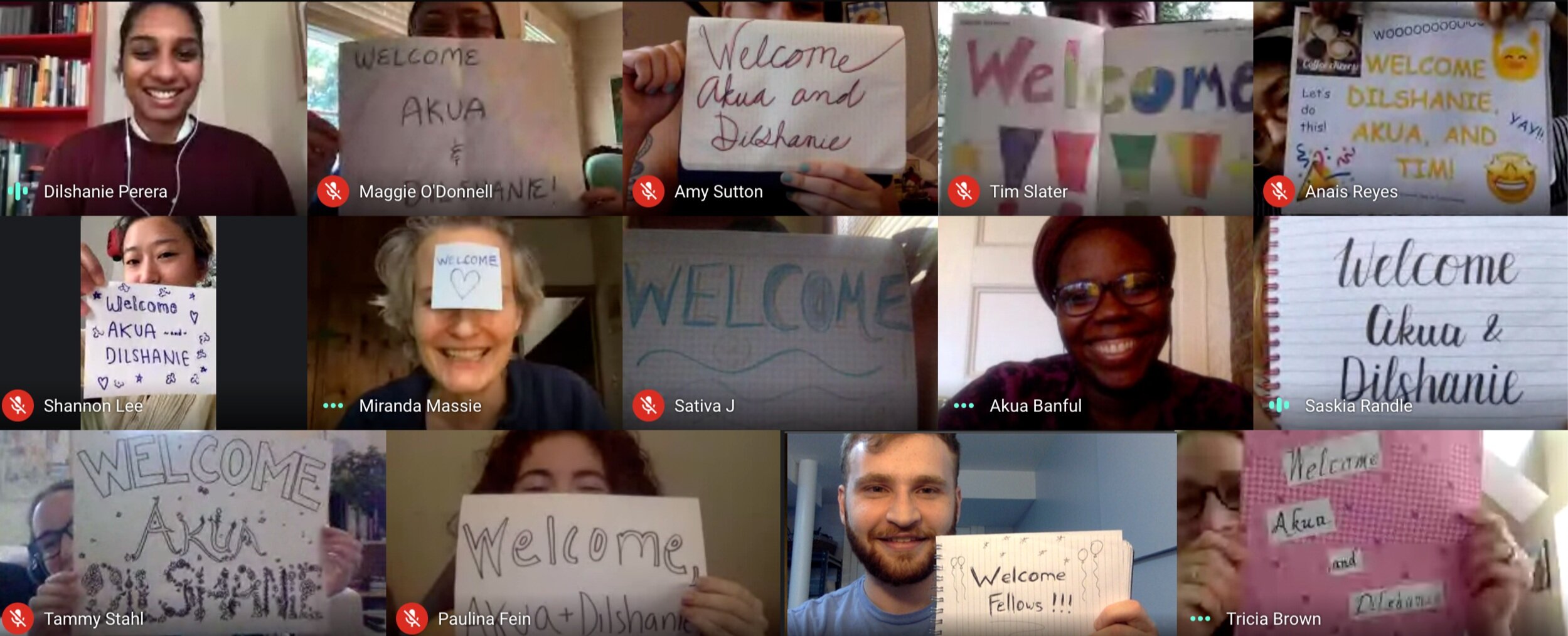Meet the Mellon Fellows in Climate and Inequality
Please join us in welcoming two extraordinary new team members, Akua Banful and Dilshanie Perera, the Climate Museum’s Andrew W. Mellon Foundation Fellows in Climate and Inequality. We asked them to share their Climate Museum origin stories, as well as a peek into their backgrounds and research. Read what they had to say below!
Akua Banful
Andrew W. Mellon Foundation Pre-Doctoral Fellow in Climate and Inequality
Photo Credit: Lauren Hoffman
It was late one night in September 2015, and I was bleary eyed, wading through the readings for one of my first graduate seminars on Postcolonial theory. As I was reading an essay on decolonization by Jennifer Wenzel, I noticed a line, surreptitiously inserted, that changed the direction of the piece, and my intellectual trajectory. The sentence, which hit me like a ton of bricks, reads: "one additional object of decolonization further illustrates the complex, non-linear relationship between mid-twentieth century struggles and postcolonial theory: nature." Up until that point, I had considered myself a cross between a scholar of empire and postcolonialism, but I had never seriously taken nature into account.
Nearly five years later, while I was in the middle of writing a dissertation on how the intersections between climate and colonialism in the tropics surface in a range of literature, an email announcing the Mellon Fellowships in Climate and Inequality at the Climate Museum caught my attention. I had recently taken a leap and decided to bridge my scholarly, more historical interests in and approaches to the study of climate with the contemporary conversations surrounding climate crisis and catastrophe via the literary and visual arts. In a project conceived under a Public Humanities fellowship, I was putting the finishing touches on the syllabus for an experimental class on the climate arts at the Bard High School Early College, Manhattan. And now, here came this call for applications, offering an opportunity to put my scholarly, pedagogical, and art-historical interests to work in an outreach role, to 'talk climate' in addition to researching and teaching it; it seemed something straight out of my dreams.
Being offered the Pre-Doctoral fellowship in Climate and Inequality felt like a path towards becoming a part of the climate movement in a bigger, more active, and multifaceted way—one that combines the tradition of museums as communal, contemplative spaces with the range of sustained action and engagement that the climate crisis asks of us all.
I consider myself fortunate to work as both a scholar and advocate on climate, and I'm excited to call the Climate Museum a professional home where I can wear both those hats, and use critical examinations of the history and culture of climate to deploy the imaginations of various communities as they rise to meet the challenges presented by our climate crisis.
Dilshanie Perera
Andrew W. Mellon Foundation Post-Doctoral Fellow in Climate and Inequality
Photo Credit: Abdul Alim
When the Climate Museum first circulated the call for a post-doctoral fellow, I heard about it from a number of friends who forwarded the email, asking, sometimes in all caps, “Have you seen this?!” The fact that the Museum was looking for someone working on climate and inequality was immediately intriguing. My doctoral research in anthropology focused on exactly this intersection. I was additionally moved by the fact that the Climate Museum is dedicated to spurring action in the world and reaching broad audiences.
My dissertation sought to understand the emergent risks of climate change in Bangladesh alongside multiple histories of ecological disaster, land dispossession, and structural inequality. I conducted long-term fieldwork with a variety of people in Dhaka and Khulna, ranging from weather forecasters to rice farmers to government officials. All of them shared stories of past catastrophic storms as well as their future expectations. The urgency of different risks and the possibilities of rebuilding after disaster look different from their different vantage points. Conversations about the effects of climate change are ongoing in Bangladesh among various constituents. Pre-existing inequalities of all kinds are exacerbated by climate and weather effects.
Paying attention to weather and water makes me think back to firsthand accounts of those who had experienced the Indian Ocean tsunami in 2004 and Hurricane Katrina in 2005, when it was so clear that government mismanagement had intensified the depth of those disasters. So too in the case of Hurricane Maria in 2017. The people who were hardest hit were already vulnerable, not as an essential condition of their being, but through multiple forms of social, political, and economic disavowal. Environmental justice efforts in Bangladesh, the US, and around the world address the inequities of poverty, racism, and other forms of structural violence as they contend with changing ecologies. I have been inspired by such movements in the places I have lived, and wanted to get more directly involved in efforts to address the climate crisis through an intersectional framework.
I am enlivened by the Climate Museum’s commitment to inspiring collective action to confront the climate crisis. I believe that action that strives to make lasting change has to be collective. Just as climate change comes to saturate our present conditions, so too does our response require sustained, collaborative, and continuous engagement at multiple scales.



